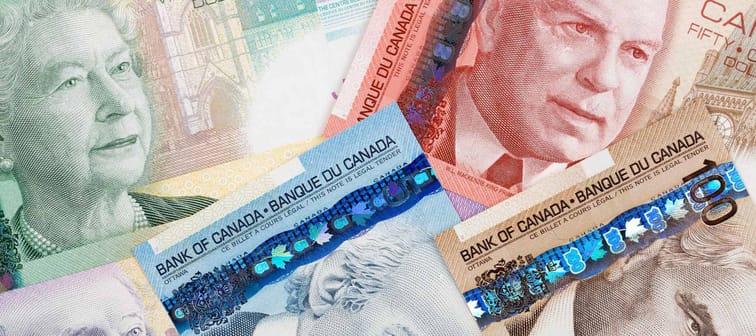1. Check for unclaimed cheques
You might have already earned free money in the form of a tax credit — but you just haven’t claimed it yet. Well, you won’t have to go hunting, because you can find out with the click of a button.
The Canada Revenue Agency (CRA) has a handy link on its website that will display any tax or benefit cheques you haven’t cashed. If you don’t already have a CRA My Account, you can register now or log in via a My Service Canada account.
When the new feature came out in February 2020, the government said it was trying to reunite Canadians with approximately $1 billion of their own money. People on X (formerly known as Twitter) were shocked to find they had hundreds of dollars waiting, dating as far back as 2008.
Visit the "Payments the CRA sends you" section of the Government of Canada Revenue Agency to find out if you have a cheque from the CRA that you never cashed.
Empower your investments with Qtrade
Discover Qtrade's award-winning platform and take control of your financial future. With user-friendly tools, expert insights, and low fees, investing has never been easier.
Start Trading Today2. Maximize your RRSPs and TFSAs
High-interest savings accounts (HISAs) are good, but growing your wealth totally tax free is even better.
Registered Retirement Savings Plans (RRSPs) and Tax Free Savings Accounts (TFSAs) are two of the most powerful tools you have at your fingertips.
You can fill them with cash or investments like stocks and bonds. Investing in an RRSP reduces your taxable income, while all the interest, dividends and earnings made in a TFSA are completely shielded from taxes, even capital gains tax.
While TFSAs are more flexible, contributing to an RRSP will reduce the amount you owe at tax season, potentially leading to a refund landing in your mailbox. And many employers will match contributions you make to group RRSPs, offering another source of completely free cash. You can't withdraw your RRSP until your retire without facing penalties and charges. Prioritize the TFSA for its withdrawl flexbility and that it's easier to max out every year.
If you don't have a TFSA or RRSP yet, you might want to consider opening one through a robo-advisor, which will manage your investments for you.
3. Scan for benefits that fit you
So you’ve got a vague sense that you might qualify for some government benefits, but you don’t have time to comb through all the rules and stipulations surrounding dozens of programs.
Lucky for you, Canada’s benefits finder tool will automatically track down programs that might apply to you based on the intricacies of your unique, modern life.
All you have to do is enter some basic information about yourself and watch the potential payday roll in.
Unexpected vet bills don’t have to break the bank
Life with pets is unpredictable, but there are ways to prepare for the unexpected.
Fetch Insurance offers coverage for treatment of accidents, illnesses, prescriptions drugs, emergency care and more.
Plus, their optional wellness plan covers things like routine vet trips, grooming and training costs, if you want to give your pet the all-star treatment while you protect your bank account.
Get A Quote4. Grab grants through an RESP
Post-secondary education can be incredibly pricey, so let the government shoulder some of the cost by maximizing your Registered Education Savings Plan (RESP).
An RESP allows you to save and invest for your kids’ education, completely tax free, but the best benefit is free money through the Canada Education Savings Grant (CESG). You can contribute to an RESP for up to 31 years, and the plan can remain open for a maximum of 35 years. Under the CESG, the government matches 20% on the first $2,500 contributed annually to an RESP, to a maximum of $500 per beneficiary per year. The lifetime maximum per beneficiary is $7,200, up to age 18.
When you overcontribute to an RESP, there are tax implications. Each subscriber for that beneficiary is liable to pay a 1% per month tax on their share of the excess contribution (that is not withdrawn by the end of the month).
Lower- and middle-income families can also qualify for the Canada Learning Bond. How much you receive depends on how many kids you’ve got and your income level.
You don’t even need to put a single dollar in the plan to qualify; you just need an RESP. The government will contribute up to $2,000 per child, starting with up to $500 for the first year and up to $100 every year the child is eligible until they turn 15.
5. Get money to make your home safer
Looking after your aging parents who have trouble getting around, or maybe you have mobility issues of your own? Older people and people with disabilities can get a tax credit for upgrades in their home.
The Home Accessibility Tax Credit helps pay for renovations that make your house easier to navigate or reduce the chance of injury.
Think chair lifts and wheelchair ramps.
Before 2022, you could claim up to $10,000 of eligible home improvements per year and get 15% back when you filed your tax return.
For the 2022 and 2023 taxation years, the annual expense limit was increased to $20,000 to allow for a maximum tax credit of $3,000 (15% of $20,000).
6. Enjoy your old age income
You’ve worked your entire adult life. Now it’s finally time to rest on your laurels and reap the benefits.
The Old Age Security (OAS) pension is a form of basic income for seniors aged 65 and older. In most cases, you don’t even have to apply to receive it.
As of June 2024, the maximum monthly OAS payment in Canada is $713.34 for recipients aged 65-74 and $784.67 for those aged 75 and older.
Those pulling in very little money in retirement can compound their OAS income with the Guaranteed Income Supplement (GIS). That could be another $1,065.47 per month, depending on your income and marital status.
7. Recoup the cost of having kids
Parenting can be a thankless job, but a fistful of cash can make up for all the sleepless nights and soccer chaperoning.
With the Canada Child Benefit, parents of kids under 18 can get a sizable monthly payment, tax-free. How much is determined by the number of kids you have, their age and your family’s income. The highest annual benefit amount for children under the age of six is $7,437 per child, and the maximum annual benefit for children from 6 to 17 is $6,275.
8. Dig up forgotten bank accounts
You know that thrill of finding a $10 bill in a pair of jeans you don’t wear often? Now imagine those jeans were an old bank account.
The Bank of Canada runs a registry that will allow you to recover forgotten money in accounts that have been inactive for 10 years or more.
Don’t think you left anything behind? In 2021, Canada’s central bank distributed $15.2 million to forgetful account holders, with the oldest balance dating back to 1913. But that pales in comparison to the $1.06 billion left in unclaimed balances at the end of that year.
Add your name to the Unclaimed Balances Registry, just in case.
9. Net twice as much for school
Going back to university is stressful enough when you’re not under the threat of a global pandemic. Thankfully, the government will give you some extra money for your troubles.
The payout for the Canada Student Grant has been boosted for the last few years. The grant helps students from low- and middle-income families who are enrolled in undergraduate studies.
Until the end of the 2023-2024 academic year, full-time students could receive up to $4,200 per year or up to $525 per month of study.
10. Save the earth, save money
Everyone has a stake in preserving our natural resources and stopping climate change. That’s why each province and territory in Canada, plus some cities and utility companies, offer incentives for energy-saving upgrades to your home.
You could get a tax credit or cash incentive for anything from caulking your windows to starting a rooftop garden. You could collect hundreds or even thousands of dollars, and that’s without counting the money you’ll save on your energy bill.
If you happen to own a business, you can double dip on incentives by making commercial upgrades, like installing an air curtain at your front door.
Trade Smarter, Today
Build your own investment portfolio with the CIBC Investor's Edge online and mobile trading platform and enjoy low commissions. Get 100 free trades and $200 or more cash back until March 31, 2025.









